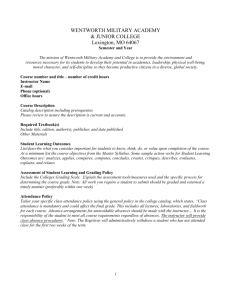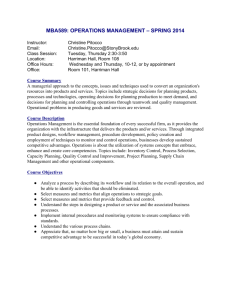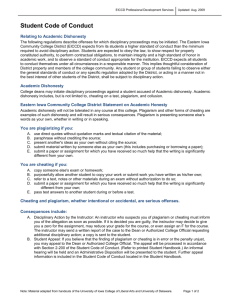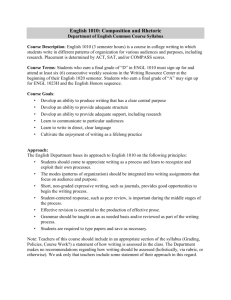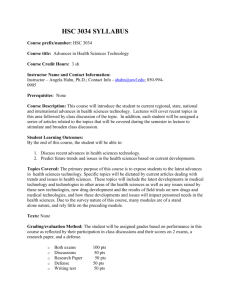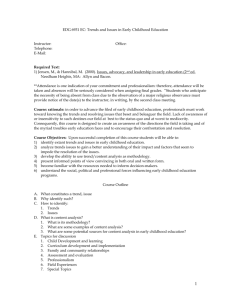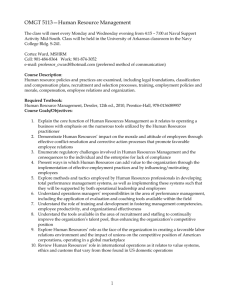English 1101 – CRN 20604
advertisement
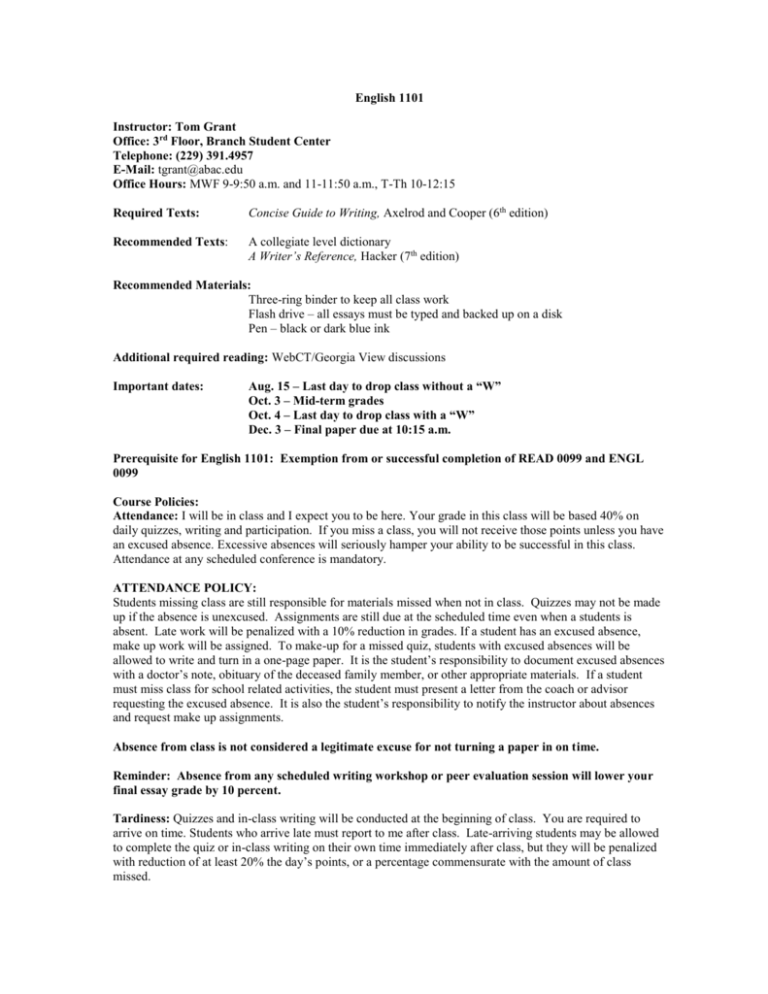
English 1101 Instructor: Tom Grant Office: 3rd Floor, Branch Student Center Telephone: (229) 391.4957 E-Mail: tgrant@abac.edu Office Hours: MWF 9-9:50 a.m. and 11-11:50 a.m., T-Th 10-12:15 Required Texts: Concise Guide to Writing, Axelrod and Cooper (6th edition) Recommended Texts: A collegiate level dictionary A Writer’s Reference, Hacker (7th edition) Recommended Materials: Three-ring binder to keep all class work Flash drive – all essays must be typed and backed up on a disk Pen – black or dark blue ink Additional required reading: WebCT/Georgia View discussions Important dates: Aug. 15 – Last day to drop class without a “W” Oct. 3 – Mid-term grades Oct. 4 – Last day to drop class with a “W” Dec. 3 – Final paper due at 10:15 a.m. Prerequisite for English 1101: Exemption from or successful completion of READ 0099 and ENGL 0099 Course Policies: Attendance: I will be in class and I expect you to be here. Your grade in this class will be based 40% on daily quizzes, writing and participation. If you miss a class, you will not receive those points unless you have an excused absence. Excessive absences will seriously hamper your ability to be successful in this class. Attendance at any scheduled conference is mandatory. ATTENDANCE POLICY: Students missing class are still responsible for materials missed when not in class. Quizzes may not be made up if the absence is unexcused. Assignments are still due at the scheduled time even when a students is absent. Late work will be penalized with a 10% reduction in grades. If a student has an excused absence, make up work will be assigned. To make-up for a missed quiz, students with excused absences will be allowed to write and turn in a one-page paper. It is the student’s responsibility to document excused absences with a doctor’s note, obituary of the deceased family member, or other appropriate materials. If a student must miss class for school related activities, the student must present a letter from the coach or advisor requesting the excused absence. It is also the student’s responsibility to notify the instructor about absences and request make up assignments. Absence from class is not considered a legitimate excuse for not turning a paper in on time. Reminder: Absence from any scheduled writing workshop or peer evaluation session will lower your final essay grade by 10 percent. Tardiness: Quizzes and in-class writing will be conducted at the beginning of class. You are required to arrive on time. Students who arrive late must report to me after class. Late-arriving students may be allowed to complete the quiz or in-class writing on their own time immediately after class, but they will be penalized with reduction of at least 20% the day’s points, or a percentage commensurate with the amount of class missed. In the event the college campus is closed for an extended period of time, the course work and assignments will be arranged through WebCT. Etiquette: You are expected to treat each other with respect and courtesy at all times. Controversial topics may arise throughout the semester; we are all entitled to our own opinions, but we should be open and accepting of others’ opinions. Because this class emphasizes critical thinking and sound reasoning, constructive discussion will focus the reasons behind our opinions and learning to understand why our opinions differ from those of others. If a student is disrespectful at any point to classmates, he or she may be asked to leave the classroom and will be counted absent for that day. I expect everyone to participate openly in classroom discussions and share ideas without showing disrespect to others. Participation: Because this class is designed as a workshop, participation is essential to the learning environment. Participating in class does not mean being merely a warm body in a seat; rather, participation involves coming to class having read the assigned material and being ready to discuss or ask questions about the assignment. Participation encompasses class discussions, freewriting, and peer reviews. Failure to participate actively in class will adversely affect a student’s grade. Quizzes and in-class writing: Each day, you will have a quiz on material in your reading and class discussions. Read the discussion on WebCT before class to prepare for the quiz. On some days, in-class writing may be substituted for the quiz. Late Work: Assignments are due at the beginning of the class period on the due date. Failure to meet the deadline will result in a penalty of 10% of the grade. Do not wait for me to ask for your paper; place them on the front desk when you arrive. Academic Honesty/Plagiarism: There is nothing wrong with presenting someone else’s words and ideas in your own writing. In fact, most non-practical learning occurs as people read each other’s ideas, and then synthesize and build on those ideas. Some other cultures may not insist on documenting sources; however, American institutions do. The key to properly using others’ ideas in your writing lies in acknowledgement and citation. As a result, to avoid plagiarism, it is very important that you give credit where it is due. Plagiarism is using others’ ideas and words without clearly acknowledging the source of that information. To avoid plagiarism, you must give credit whenever you use another person’s idea, opinion, or theory any facts, statistics, graphs, drawings – any pieces of information-that are not common knowledge; quotations of another person’s actual spoken or written words; a paraphrase or summary of another person’s spoken or written words. Penalties for Plagiarism: Since one of the goals of this class is to teach you how to use the tools of proper documentation to acknowledge others’ ideas in your work, plagiarism is broken into the following two categories: Inadvertent Plagiarism: If you make the attempt to use the tools of documentation, but fail to do so correctly, this is considered unintentional – a part of the learning process. Consequently, errors of this sort as determined by the instructor will be considered as major errors during the grading process, and will affect the assignment’s grade accordingly, but may not automatically result in a failing grade for the assignment or the course. Intentional Plagiarism: When you use material from an outside source without any attempt at proper documentation (such as “cutting and pasting” passages from one or more sources), this is considered to be intentional plagiarism. This includes using material from a source without documenting it, even when you document other material from the same or different sources, so be very careful. Submitting an assignment that you did not write, whether obtained through purchase from or other arrangement with ANY person or source, will be considered cheating on the assignment, even if you make some changes to the obtained source. The type and seriousness of plagiarism will be determined by the instructor and may result in a grade of zero (0) points for the assignment or failure of the course. Cheating on a writing assignment is a violation of the college’s policy in the Student Academic Code of Conduct. If you have plagiarized on an assignment, the procedures for dealing with Academic Dishonesty are set forth in the Academic Policies and Procedures section of the ABAC catalog. Manuscript Format: All our-of-class papers must be produced on a word processor. All papers are expected to follow MLA format. MLA format requires typed, double-spaced papers with one-inch margins, and 12 pt. font. I expect the font to be Times New Roman, which is the font used in the syllabus. Any assignment not submitted in accordance with proper MLA format will automatically receive one letter grade lower on the assignment. In the upper left margin of the first page arrange identifying information in this fashion: Your name Grant English 1101 Date Identify each additional page by placing your last name and the page number in the upper right margin. Ex: your name 2 (Smith 2) Do not fold; staple all pages together before you come to class. Do not include a cover sheet. Extra Credit: Opportunities arise occasionally for students to earn extra credit by attending certain collegesponsored academic events. When such events present themselves, I will announce them in class. After attending the event, students should then submit a one-page summary of the event and what was learned. Do not expect to receive extra credit for an event I do not approve. Furthermore, do not ask for other extra credit opportunities outside the ones offered to the entire class; in fairness, the only extra credit I approve is an opportunity given to the entire class. Cell Phones/Pagers: Ringing cell phones and pagers disrupt the learning environment of the classroom. Out of respect for classmates and for the instructor, all cell phones and pagers must be either turned off or in a silent node upon entering class. Should a cell phone or pager ring or vibrate during class, the student may be asked to leave the class. Students disrupting class with ringing phones or pagers may be counted absent for the class period. Grammar: Any student enrolled in a college-level English course should have a working knowledge of grammar. Poor grammar and careless grammatical mistakes will affect an essay’s grade. The grammar sections in A Writer’s Reference will serve as a reference guide, and I will discuss grammar throughout the semester. The Academic Assistance Center: The Academic Assistance Center is staffed by faculty as well as student consultants. You can go to the Academic Assistance Center for additional assistance with every phase of the writing process. I strongly encourage you to do so. However, the Academic Assistance Center is not a proofreading service, and tutors will not “fix” problems for students. It is free for all ABAC students. Special Needs: Students requiring classroom accommodations or modifications because of a documented disability should discuss this need with the instructor at the beginning of the semester. Students not registered with Student Support Services should contact the Student Support Services office in Conger Hall. Course Requirements and Grading: Essays – 60% In-Class quizzes and writing -- 30% Class attendance and participation – 10% Essays: Students will have a writing assignment due every Monday at the beginning of class. The final writing assignment will be due during Finals Week at the assigned time for finals. Writing assignments will vary from week to week, and all assignments can be found on WebCT. Some assignments will be drafts for upcoming essays. The bulk of the course will focus on developing four central essays of at least three pages in length plus one page listing references, if required. When each essay is assigned, students will receive a detailed handout explaining the nature of the essay, including the required length, topic, and other details. In weeks leading up to those essays, students will engage in the writing process by preparing a series of drafts and revisions. In addition to instructor comments, peer review workshops will be used to help guide students’ revisions. When the final draft of each essay is due, students will include in their essay packets all previous drafts from peer reviews and conferencing, and a final, clean copy of the essay. Materials must be in an envelope (large size). Peer Review: Students will read and offer feedback to their peers in class. On designated Peer Review Workshop days in class, students are expected to bring 3 copies of a draft of their essay. Grading is based on active participation, such as thorough completion of Peer Review Guidelines. Students are expected to read and respond thoughtfully to other student’s drafts. Reading Exercises: Students are required to read everything assigned from our text, Axelrod & Cooper’s Concise Guide to Writing. I will give quizzes over reading assignments. It is crucial that students read from the text, as it provides models and suggestions that will help write the out-of-class essays. *** The instructor reserves the right to alter the syllabus if circumstances warrant. Course Syllabus Course Name: COMPOSITION I Course Number: ENGL 1101 Course Description: A composition course focusing on skills required for effective writing in a variety of contexts, with emphasis on exposition and argumentation, and also including introductory use of a variety of research skills. Fall, Spring, Summer. Pre-requisites/Co-requisites: Prerequisite: Exemption from or successful completion of READ 0099 and ENGL 0099. USG General Education Outcomes Pertinent to this Course: Communications: Oral and written communication will be characterized by clarity, critical analysis, logic, coherence, persuasion, precision, and rhetorical awareness. Competence within the context of collegiate general education is defined by the following outcomes: o Ability to assimilate, analyze, and present in oral and written forms, a body of information; o Ability to analyze arguments; o Ability to adapt communication to circumstances and audience; o Ability to consider and accommodate opposing points of view; o Ability to interpret content of written materials on related topics from various disciplines; o Ability to communicate in various modes and media, including the proper use of appropriate technology; o Ability to produce communication that is stylistically appropriate and mature; o Ability to communicate in standard English for academic and professional contexts; o Ability to interpret inferences and develop subtleties of symbolic and indirect discourse; o Ability to sustain a consistent purpose and point of view; o Ability to compose effective written materials for various academic and professional contexts. ABAC Course Learning Outcomes: Composition I Course Outcomes/Objectives: 1101 Outcomes Students who successfully complete the course will 1. Write competently with a sense of audience and purpose. 2. Write with a clear central idea supported effectively and organized appropriately 3. Analyze the rhetorical situation and choose the appropriate genre and writing strategies. 4. Produce writing with an effective command of standard English grammar, usage, and punctuation. 5. Practice the collaborative and social aspect of the writing process and demonstrate an ability to critique their writing and the writing of others. 6. Employ basic research methods and document sources ethically. INSTITUTIONAL ABSENCE A student who serves as an official representative of the college is defined as one who: 1. is authorized to use the college name in public relationships outside the institution; 2. regularly interacts with non-college individuals and groups over an extended period of time (at least one semester); 3. represents the college as a part of a group and not as an individual; 4. represents the college under the direct supervision of a college faculty or staff member; and 5. is authorized in writing, in advance, by the President of the college. Such a student is in no way released from the obligations and responsibilities of all students, but will not be penalized with unexcused absences when absences result from regularly scheduled activities in which he/she represents the college. Further, it is the responsibility of each student to contact instructors prior to the absence and to make arrangements to make up any work that will be missed, in a manner acceptable to the instructor. Advisors of activities will schedule off-campus activities in a manner that does not unduly disrupt the learning process for a student. College Policy on Academic Dishonesty: A. Academic Dishonesty Academic irregularities include, but are not limited to, giving or receiving of unauthorized assistance in the preparation of any academic assignment; taking or attempting to take, stealing, or otherwise obtaining in an unauthorized manner any material pertaining to the education process; selling, giving, lending, or otherwise furnishing to any person any question and/or answers to any examination known to be scheduled at any subsequent date; fabricating, forging, or falsifying lab or clinical results; plagiarism in any form related to themes, essays, term papers, tests, and other assignments; breaching any confidentiality regarding patient information. B. Disciplinary Procedures 1. When a faculty member suspects that a student has engaged in academic dishonesty, the faculty member will contact the Office of the Vice President for Academic Affairs. The Vice President for Academic Affairs will notify the student in writing of the report and will appoint a neutral person from among the faculty or staff to meet with the faculty member who reported the matter and the student(s) believed to have engaged in academic dishonesty. The purpose of the meeting, to be scheduled by the Office of the Vice President for Academic Affairs, will be to provide a facilitated discussion about what may have occurred. The faculty member who reported the matter, the student(s) believed to have engaged in academic dishonesty, and the facilitator are the only participants in the meeting. Audio nor video recordings of these proceedings will be permitted. Following the discussion, the facilitator will submit a form summarizing results of the proceedings to the Office of the Vice President for Academic Affairs. 2. The faculty member and student(s) may reach an agreement about the matter and, if dishonesty is involved, may determine the appropriate consequences. If no resolution is agreed upon, the matter will be forwarded to the Dean of Student Life and Housing, who will convene the Student Judiciary Committee to determine the outcome of the allegation. 3. Guidelines for disciplinary procedures as outlined in Section V of the Student Code of Conduct will be applicable in cases involving alleged academic dishonesty. A written copy of the recommendations by the Student Judiciary Committee shall be sent not only to the student but also to the faculty member who made the allegations of academic dishonesty against the student, to the Vice President for Academic Affairs, and to the President. 4. Prior to any finding of responsibility on the part of the student, the faculty member shall permit the student to complete all required academic work and shall evaluate and grade all work except the assignment(s) involved in the accusation of dishonesty. The faculty member may, however, take any action reasonably necessary to collect and preserve evidence of the alleged violation and to maintain or restore the integrity of exam or laboratory conditions. 5. A student may not withdraw from a course to avoid penalty of plagiarism or other forms of academic dishonesty. C. Appeals Process Students have the right to appeal a Student Judiciary Committee hearing recommendation in accordance with the following procedures: 1. Requests for appeals must be submitted in writing to the Office of the Vice President for Student Affairs within five business days of the date of the letter notifying the student of the original decision. Failure to appeal within the allotted time will render the original decision final and conclusive. 2. Written requests for appeals must be specific and detailed as to the nature and substance of the student’s complaint and must clearly indicate what action is requested. The written request should specify the grounds for appeal. Judicial recommendations may be appealed on the following grounds: • A violation of due process • Prejudicial treatment by the original hearing body • New evidence has become available which was not available at the time of the hearing. 3. Appeals shall be decided upon the record of the original proceedings, the written appeal submitted by the defendant, and any written briefs submitted by other participants. Cases will not be reheard on appeal. 4. If the student is dissatisfied with the decision of the Vice President for Student Affairs, the student may request in writing that the President consider the appeal, but such request must be made within five business days of the Vice President’s decision or the Vice President’s decision will be considered final and conclusive. 5. Within five business days of receiving the appeal, the President will either rule on the appeal or refer the appeal to a special Presidential Panel. The Presidential Panel will review all facts and circumstances connected with the case and within five business days make a report of its findings to the President. After consideration of the Panel’s report, the President will within five business days make a decision which shall be final so far as the College is concerned. 6. Should the student be dissatisfied with the President’s decision, written application may be made to the Board of Regents for a review of the decision. This application must be submitted within twenty days following the decision of the President. Additional information regarding procedures for appealing to the Board is available in the Office of the Vice President for Student Affairs. The decision of the Board shall be final and binding for all purposes. Midterm Advisory Grades Midterm Advisory Grades will be reported on Banner Web to any student who has a “C,” “D,” or “F” in any class. The number of class absences will be posted for all students. Advisory grades are not entered on the student’s permanent record. Students should note that these grades are advisory and will not necessarily reflect the final grade earned in a course. These grades are intended to provide students with information in order to improve their performance in the second half of the semester. Students are responsible for checking Banner Web when grades and absences have been reported. Students who receive grades should meet with their instructors to develop plans for success in the second half of the semester. Students should also take advantage of study groups and plan for ongoing conferences with instructors in order to monitor their progress. ABAC provides free tutorial assistance for most courses through the Academic Assistance Center (AAC); in addition to other academic support activities, students should work with their instructors to establish tutoring in the AAC. If there is a student in this class who has specific needs because of learning disabilities or any other disability, please feel free to contact the instructor. This is a partial syllabus. More detailed information relating to the class and Instructor will be made available to each student.

